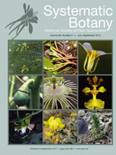
SYSTEMATIC BOTANY
Scope & Guideline
Shaping the Future of Botanical Science
Introduction
Aims and Scopes
- Taxonomic Research and Revision:
The journal frequently publishes comprehensive taxonomic revisions and descriptions of new species, highlighting the diversity and classification of plants across various families. - Molecular Phylogenetics:
A strong emphasis is placed on molecular phylogenetic studies, using genetic data to resolve complex relationships among taxa and to support taxonomic decisions. - Morphological and Morphometric Analyses:
Research often incorporates detailed morphological analyses and morphometric techniques to investigate species boundaries and variations, providing a robust framework for taxonomic classification. - Conservation and Biodiversity:
Papers addressing conservation strategies and the implications of biodiversity loss are common, reflecting the journal's commitment to the preservation of plant species and their habitats. - Biogeography and Environmental Adaptation:
Studies exploring biogeographic patterns and the ecological adaptations of plant species in response to environmental changes are integral to the journal's scope.
Trending and Emerging
- Integrative Taxonomy:
An increasing number of studies employ integrative taxonomy, combining molecular, morphological, and ecological data to provide a more comprehensive understanding of species diversity and classification. - Population Genomics and Conservation Genetics:
There is a growing trend towards using population genomics to understand genetic diversity, population dynamics, and conservation strategies, particularly for threatened species. - Phylogenomics and Advanced Molecular Techniques:
The use of phylogenomics and advanced molecular techniques, such as RADseq and plastid phylogenomics, is on the rise, facilitating deeper insights into plant phylogenies and evolutionary relationships. - Focus on Endemism and Local Flora:
Research addressing the unique flora of specific regions, particularly in biodiversity hotspots like Australia and New Zealand, is increasingly prominent, emphasizing the need for localized conservation efforts. - Environmental Adaptation and Climate Change Responses:
Emerging studies are focusing on how plants adapt to changing environments and climate, reflecting a broader ecological awareness within the field of botany.
Declining or Waning
- Traditional Morphological Taxonomy:
There is a noticeable decrease in papers solely relying on traditional morphological taxonomy without molecular support, as the field moves towards integrative approaches that combine molecular and morphological data. - Historical Biogeography Studies:
Research focusing exclusively on historical biogeography, without integrating modern ecological data or molecular phylogenetics, has become less frequent, possibly due to the evolving understanding of plant evolution. - Invasive Species Research:
While still important, studies on invasive species within the context of systematic botany have diminished, possibly as the focus shifts to native biodiversity and conservation.
Similar Journals
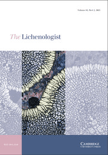
LICHENOLOGIST
Exploring the Intersection of Ecology and LichenologyLICHENOLOGIST is a prestigious journal published by Cambridge University Press, dedicated to advancing the field of lichenology and promoting a deeper understanding of the ecology, evolution, and systematics of lichens. Established in 1958 and focusing on the convergence of research through 2024, this journal has established itself as a significant resource within the Q2 category of Ecology, Evolution, Behavior and Systematics. With a Scopus ranking of #316 out of 721 in its field, it highlights research that not only enhances academic knowledge but also has practical implications for ecology and conservation efforts globally. Although traditionally not an open-access journal, it provides valuable insights and contributes to the scientific community by disseminating high-quality, peer-reviewed research. LICHENOLOGIST is essential for researchers, professionals, and students looking to stay informed about the latest advancements in lichen studies, making it an indispensable resource for anyone involved in ecological and biological sciences.
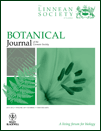
BOTANICAL JOURNAL OF THE LINNEAN SOCIETY
Fostering Innovation in Botanical Research and TheoryThe Botanical Journal of the Linnean Society, published by Oxford University Press, stands as a premier platform for interdisciplinary research within the realms of Ecology, Evolution, Behavior, and Plant Science. With a notable impact factor reflective of its esteemed reputation, this journal is classified in the Q1 quartile for both Ecology and Plant Science, placing it among the most influential publications in these fields. Since its inception in 1969, and with an anticipated convergence of research extending to 2024, it has become essential for scholars and professionals seeking to engage with cutting-edge studies, theoretical frameworks, and practical applications that drive our understanding of plant biology and ecological systems. The journal’s commitment to excellence is underscored by its robust Scopus rankings—achieving an impressive 83rd percentile in Ecology and a 82nd percentile in Plant Science. This makes the Botanical Journal of the Linnean Society a crucial resource for researchers, educators, and students alike, eager to advance their knowledge and contribute to the evolving discourse in botany and environmental studies.
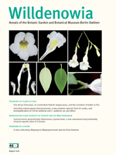
Willdenowia
Cultivating a deeper understanding of the plant kingdom.Willdenowia is a prestigious scientific journal published by the Botanischer Garten & Botanische Museum Berlin-Dahlem, dedicated to advancing the field of botany and plant sciences. With an ISSN of 0511-9618, this journal has established itself as a crucial platform for researchers, practitioners, and students interested in ecology, evolution, behavior, systematics, and plant science. The journal boasts an impactful reputation, evidenced by its impressive Q1 and Q2 quartile rankings in Plant Science and Ecology, Evolution, Behavior and Systematics respectively, as well as notable Scopus rankings, placing it within the top quartiles of its categories. Although access is not open, articles published in Willdenowia contribute significantly to the global body of botanical research, making it an essential resource for anyone looking to deepen their understanding of plant biology and related ecological disciplines. The journal has continuously evolved since its inception and aims to facilitate interdisciplinary collaboration and knowledge dissemination in the life sciences.
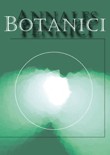
ANNALES BOTANICI FENNICI
Championing High-Quality Research for a Greener FutureANNALES BOTANICI FENNICI, published by the Finnish Zoological Botanical Publishing Board, is a distinguished journal that has served as a vital platform for advancing research in the fields of Ecology and Plant Science since its inception. With an ISSN of 0003-3847 and an E-ISSN of 1797-2442, this journal has established a reputation as a Q3 category publication in both Ecology, Evolution, Behavior and Systematics, and Plant Science as of 2023. Although it presently does not offer open access options, the journal remains a cornerstone in the dissemination of important research findings and methodologies pertinent to these scientific domains. By promoting high-quality research, ANNALES BOTANICI FENNICI not only contributes to scholarly discourse but also enriches the academic community in Finland and beyond. Researchers, professionals, and students are encouraged to explore its archives, engaging with a wealth of knowledge that spans over four decades, from 1973 to 2023, thereby enhancing their understanding and furthering their studies in botany and ecology.
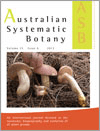
AUSTRALIAN SYSTEMATIC BOTANY
Advancing the Science of Australian FloraAustralian Systematic Botany is a prestigious academic journal dedicated to the field of plant science, published by CSIRO PUBLISHING. Established in 1988, this journal has become a vital resource for researchers, professionals, and students focusing on the systematic study of Australian flora. With an impressive track record and convergence extending to 2024, it operates in the Q3 category for Ecology, Evolution, Behavior and Systematics and Q2 for Plant Science as of 2023. The journal holds significant value in the academic community, given its Scopus ranking, which places it in the 61st and 59th percentiles within its respective categories. Although it follows a subscription-based model, the journal remains committed to advancing knowledge in systematic botany, offering critical insights that shape the future of ecological and biological research both in Australia and globally.
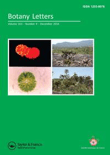
Botany Letters
Catalyzing Discoveries in Plant Science and ConservationBotany Letters, published by Taylor & Francis Ltd, is a prominent journal in the field of Plant Science based in the United Kingdom. With its ISSN 2381-8107 and E-ISSN 2381-8115, the journal has established itself as an essential resource for researchers, professionals, and students alike, focusing on innovative studies and findings in botany. As a Q2 ranked journal in its category (2023) and holding a respectable Scopus rank of #200 out of 516 in Agricultural and Biological Sciences, it reflects a robust commitment to quality and relevance in the field. The journal's open access model ensures that groundbreaking research is readily accessible, fostering collaboration and knowledge sharing among the global scientific community. Covering a broad spectrum of topics within plant science from 2016, Botany Letters aims to catalyze advancements in the understanding and management of plant biodiversity and sustainability, ultimately contributing to conservation efforts and agricultural innovation.
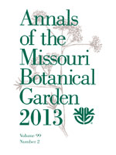
ANNALS OF THE MISSOURI BOTANICAL GARDEN
Fostering Innovation in Plant Biology and ConservationANNALS OF THE MISSOURI BOTANICAL GARDEN is a prestigious, peer-reviewed journal published by the Missouri Botanical Garden, focusing on the rich disciplines of Ecology, Evolution, Behavior, and Plant Science. With a storied history dating back to 1946, this journal has evolved to become a significant platform for scholars and professionals to disseminate research that informs global understanding of plant biology and conservation. Ranked in the Q2 category for both Ecology and Plant Science in 2023, it boasts commendable standings within the Scopus rankings, placing it in the 66th percentile for Plant Science and the 65th percentile for Ecology, Evolution, Behavior, and Systematics. The journal's commitment to rigorous scientific standards ensures that it remains a vital resource for those seeking to explore vital ecological and botanical research. As a product of the esteemed Missouri Botanical Garden, the journal serves researchers, professionals, and students alike, encouraging collaboration and innovation in the plant sciences community.
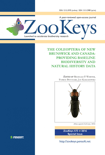
ZooKeys
Exploring the Frontiers of Zoology and Beyond.ZooKeys, published by Pensoft Publishers, is a premier open access journal dedicated to all aspects of zoology and related biological disciplines. Since its inception in 2008, ZooKeys has emerged as a leading platform in the field, consistently showcasing groundbreaking research that spans diverse areas including animal science, ecology, and paleontology. With an impressive impact factor and categorized in the Q1 quartile for several categories such as Agricultural and Biological Sciences and Insect Science, the journal is recognized for its scholarly contributions, attracting researchers and professionals globally. Located in Sofia, Bulgaria, ZooKeys not only enhances the visibility of its publications through rigorous peer review but also ensures accessibility to vital findings, furthering academic discourse. As the journal continues to converge research efforts through 2024 and beyond, it remains an invaluable resource for students and academics aiming to stay at the forefront of zoological and ecological innovation.

BULLETIN OF THE AMERICAN MUSEUM OF NATURAL HISTORY
Connecting scholars to the latest in natural history advancements.BULLETIN OF THE AMERICAN MUSEUM OF NATURAL HISTORY, published by the American Museum of Natural History, represents a cornerstone of scholarly communication in the fields of Agricultural and Biological Sciences and Ecology. With an impressive impact factor highlighted by its Q1 quartile rankings in both categories, the journal publishes high-quality, peer-reviewed research that significantly contributes to the understanding of natural history. Researchers will find this journal indispensable as it covers a diverse range of topics, providing insights that drive ecological research and biological discovery forward. Although not open access, the Bulletin is widely available through institutional subscriptions, making it accessible to both established professionals and students eager to stay informed about the latest advancements in the field. Its commitment to advancing knowledge from 1996 to the present ensures that it remains relevant and highly regarded within the scientific community.
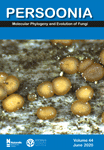
PERSOONIA
Unveiling Insights in Ecology and EvolutionPERSOONIA, a distinguished journal published by RIJKSHERBARIUM, serves as a pivotal platform for the dissemination of high-quality research in the fields of Ecology, Evolution, Behavior, and Systematics, as well as Plant Science. Established with a commitment to advancing scientific knowledge, PERSOONIA has achieved an impressive Q1 ranking in these areas, highlighting its significant impact within the academic community, as evidenced by its ranking of #12 out of 721 journals in its field, placing it in the top 2% of publications. With a publication history that spans from 1996 to present, the journal regularly features innovative studies that push the boundaries of understanding in ecological and botanical sciences. While Open Access options are currently limited, researchers and professionals alike benefit from subscription access to this vital resource. Located in the Netherlands, PERSOONIA continues to be a beacon for scholars aiming to enrich the discourse in evolving ecological and plant science disciplines.